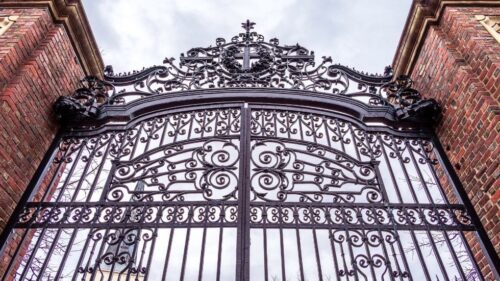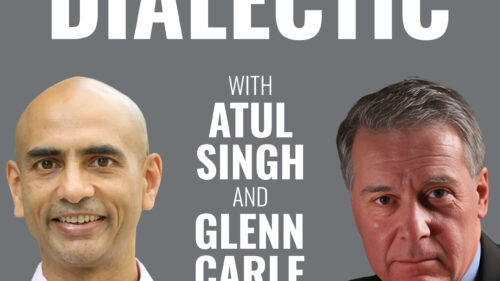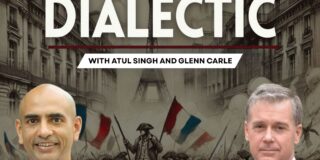Atul Singh: Welcome to The Dialectic, by the Rajput and WASP. I’m the Rajput.
Glenn Carle: And I am the WASP.
Atul Singh: Today, indeed, we are going to talk about “Why Donald Trump Targets Harvard, and Why That Matters.” So, Glenn, you went to Harvard. You played ice hockey for Harvard.
Glenn Carle: I did.
Atul Singh: You still wear your Harvard sweatshirt, which is only 200 years old. (Chuckles)
Glenn Carle: My children refuse to be seen in public with me if I have any Harvard insignia anywhere on my person.
Atul Singh: Oh, deary me. But you still clearly have loyalty to the institution. You clearly have a good understanding of government because you have spent a long time serving the government. You didn’t just serve the CIA — you reported to the White House, and you’re a historian by training.
Glenn Carle: I worked in the White House.
Atul Singh: Yeah, you worked in the White House. So educate us. What is going on? Why does it matter?
Glenn Carle: So, Harvard’s an easy target, and one that everyone will — at least initially, superficially, for a moment — pay attention to or become aware of, because Harvard’s name is Harvard. The only thing that foreigners will tend to have heard of in American educational circles will be Harvard — rightly, wrongly, justifiably or not. Largely justifiably.
Atul Singh: I call it the “Harvard and Hollywood effect.”
Glenn Carle: Yeah. I think those are the two things that people really know. And then obesity, football and American military actions.
Atul Singh: The football — American football — is not that well known, actually, in many countries, including India. But the military is. And so is Silicon Valley, to be fair.
Glenn Carle: That’s fair enough. Okay. But so what’s happening now? I think most people will know that the Trump administration is attacking, I guess we could say, Harvard on the ostensible subject of antisemitism and woke culture and bias in education. But really, what is happening? This is a far larger issue than a simple tiff between a conservative administration and the icon of the American elite and, ostensibly, the American left. Harvard has for many decades been called, by Republicans at least, “The Kremlin on the Charles.”
Atul Singh: It’s a wonderful name. (Chuckles)
Glenn Carle: Which during the Soviet era had more resonance than today, but nonetheless, it’s considered far-left. Now, the ostensible reasons are, as I say, that all of this was catalyzed by the October 7 Hamas attack on Israel, and then the following demonstrations on American campuses, including Harvard’s, against Israeli actions — and considered by conservatives in the United States, at least, as antisemitic and too biased in favor of the Palestinians. That Harvard has embraced institutionally — in its curriculum, in its faculty, in its practices regarding free speech on campus and in its student cultural and intellectual cultural life — the whole vaguely-defined “woke culture.” Which means that what are considered left-wing terms culturally are acceptable; others are not, and are ostracized.
Atul Singh: Well, there’s an element of truth to it, because I was at Harvard just after October 7, and there was a professor who told me this needed to happen — meaning these attacks needed to happen. And he made the argument that Israel is an apartheid regime, the Palestinians have been pushed into open-air prisons — the West Bank and Gaza — and these conditions are deplorable and unlivable, and the only way the Palestinians could have drawn attention to their plight was by resorting to terror. And I found this extremely dangerous, this form of reasoning. It was clearly someone left-leaning, clearly someone who’s never stepped out of a university, clearly someone who was an activist, clearly someone who grew up in a posh suburb. These comments were made in confidence and in private, so it would be remiss of me to take the name of the person. But this line of thinking was prevalent not just among certain faculty, but also among certain students — indeed, not just students who were American. I mean, this person was American, but there indeed were a number of students who were not even Muslim, who were not even Arab — they were Indians or they were Chileans — and they were all signing up for all sorts of petitions without understanding, probably, what they meant. But there is an element of truth that there was condoning of the use of terror. There was — maybe, if not antisemitism — certainly anti-Israeli sentiment. So some of that is true. And we’ll get more into woke culture when we discuss the Ivies, because Harvard is a metaphor for the Ivies and for the American elite. And a lot of insanity did go on on these campuses.
Glenn Carle: I actually think what we’re starting to talk about right now in detail is a diversion from the central point. But a lot of what you just said, Atul, really is simply a statement of fact. One needn’t conclude — or shouldn’t conclude — that terrorism, therefore, is justified. A majority of the Israeli public itself, and certainly the Labor Party in the center and the left in Israel, recognize that the Palestinians in the Gaza Strip have for years — partly by being oppressed and having no choice as a result of Hamas’s doing, partly by their own cultural paradigm and inclinations and partly by Israeli government actions — been put in a horrendous situation that only Hamas and the Israeli government could rectify. And unfortunately, as always seems to be the case, demonstrations focus on democratic governments that actually can do something in response to people’s wishes, rather than focusing on terrorist or totalitarian organizations such as Hamas, which will simply ignore you or kill you if you disagree with them. But that is, in part, sincerely the objective — but I think largely, it is a pretext for what’s going on. And what’s going on — that being those subjects and those disagreements and issues and actions by students and faculty at Harvard, in this specific instance — there are probably four major and truly existential-for-the-United-States issues at play in what the Trump administration is doing towards Harvard: The first is a direct attack, quite consciously, by American conservatives on America’s dominant culture of the past 80 years — an attack by aggrieved, conservative, less educated, more isolationist segments of society, embodied by and championed by, at present, Trump and the Trump administration.
Conservative backlash against the global elite
Glenn Carle: Harvard is the icon of America’s elite. Rightly or wrongly, it certainly is the symbol and largely the fact. It’s true that there are 161 Nobel Prize winners from Harvard. Harvard has $53 billion in endowment. It’s the third-wealthiest private institution in the world, if you put governments aside — only the Catholic Church and the Mormon Church have more money than Harvard. It has represented — less today, as America has become truly more democratic in its practices and society — but nonetheless, it has represented the center from which many of America’s business, financial, academic and political leaders have come. There have been four or six presidents from Harvard, and on and on and on. So that’s one thing.
Atul Singh: And just to add to what you’re saying: It is no longer the preeminent center for the American elite. It is now the institution of choice for the global elite. After all, where do Indian billionaires — whether it is Anand Mahindra or whether it is Lakshmi Mittal — give their money? They give it to Harvard. Even Narayan Murthy — the Murty Classical Library is at Harvard. Where do a number of Etonians now come to do their undergrad?
Glenn Carle: Where did Xi Jinping’s daughter study?
Atul Singh: Exactly. So it is indeed — you’re absolutely correct in saying it is an elite institution — but it is now home to the global elite. And the Harvard Kennedy School, the Harvard Business School, the Harvard PhD programs — and especially the science degrees — are home to a number of foreigners.
Glenn Carle: It’s a good point. Depending on one’s perspective — if you are from the Trump perspective, those who are attacking Harvard through the Trump administration — it is evidence of the problem itself: these globalized, cosmopolitan elites. If you’re from the other perspective, it’s an example of the triumph of American society and American ideals — to become more open, more meritocratic, more diverse and so on. So that’s one issue. The second major issue at play — and I touched upon it already — is that this is a direct attack upon America’s ruling elites by those now not just ascendant, but sitting in the White House and controlling the levers of government: from the Supreme Court, to the Congress, to the White House against the policies and values of that ruling group — largely in the Northeast, not exclusively, but heavily centered in the Ivy elite institutions and on the West Coast — and this is an effort to bring them down by the now-triumphant Neo-right. The third thing is it’s an even more broad but very explicit and conscious attack by those same groups on secularism, cosmopolitanism — this sounds like very 1930s left-right jargon, but it is very important and relevant — on globalization and on humanism itself. On the secular, rational foundation of society, government and knowledge itself. I’m not exaggerating. It is a repudiation of trying to bring down those who have set the tenor, the tone and the truths that have shaped society and government comportment since the Scopes Trial in 1926 or the rise of Darwinism. And then finally, it’s a direct assault on America’s system of democracy and government — on the separation of powers, on reaching social consensus in favor of what is, frankly — and I am not exaggerating, I am choosing my words very carefully — a fascist construction. A fascist system of government, which I’ll talk about later. It’s called the “unitary theory of executive power,” and it is being explicitly pursued by the Trump administration. And the attack on Harvard is one of the tools that this movement is using — which is really the right wing of the Republican Party, which is now dominant and really, exclusively is the Republican Party — that shapes, defines and guides all of the policy steps and objectives of the Trump administration. Trump himself is no thinker. But he has bought into — and is following and giving free rein to — the neoconservative thinkers who are implementing this series of policies. So all of this — this attack on Harvard for those four principal reasons and objectives, constitutes — I have argued for years — the greatest threat to American institutions, government and society in America’s history.
Culture wars and campus orthodoxy
Atul Singh: Let’s take Harvard as a metaphor. Let’s talk about the deeper objectives. Let’s begin with culture wars. And culture wars have been going on in the US for a while. I have observed them as an outsider; you have lived them as an American. I have also seen that there is an element of truth to some of the things the left says — but also some of the things the right says. I’ll give you an example: I went to the Wharton School. I did my MBA there. And as you know, it’s part of the University of Pennsylvania. And as you also know — and our listeners will probably remember — there was a transgender swimmer called Lia Thomas who swam for the women’s team and won everything. Won by a country mile and more. And I had many female athletes tell me in private — because they were too scared of being labeled as transphobic in public — and they said, “Look, this is insane. This means that we have the right to compete but not the right to win.” And it wasn’t just the fact that Lia Thomas could compete for the women’s swim team, but also that everyone else had to just shut up and go along with Kremlin-speak.
Glenn Carle: Because if you didn’t, you were, by definition, a racist or a zealot.
Atul Singh: Exactly. Transphobic.
Glenn Carle: Or transphobic, in some way intolerant, elite, totalitarian and undemocratic.
Atul Singh: Exactly. And so this sort of pressure did exist. And I have to say, my university did not behave honorably in that issue.
Glenn Carle: And it’s hardly exclusive to the University of Pennsylvania. This is something that all Americans have lived with. And there’s much good — of course I subscribe to the objective of broadening opportunity for people, whether they’re green, purple, red, Hindu, Muslim or from Mars. But there is, in truth — and this is not something people “on the left” are allowed to say, because, as you just said, it proves your guilt if you assert something against the orthodoxy on the left. During my career — and anecdotes don’t make a proof, but there are an infinite number of them and every American will have experienced the following kind of circumstance — one of my bosses — you know, obviously we make jokes about how I am a WASP — this particular boss happened to be a generation older than I, but roughly from the same background. I don’t know exactly, but he certainly looked like me. And I had done something right on some issue in the office, and he walked over to me and he slapped me on the shoulder, and he said, “Well done. We need more people like you.” And then he walked away. And that was the end of it, and I felt pretty good about it. It turned out he was brought up before the human relations people for having been unfairly biased in favor of me and therefore discriminatory against others — because he was a white male, and so was I, and he had slapped me on the shoulder. And somehow that was proof that he was excluding others, when actually I had done something right and he was just trying to praise me.
Atul Singh: There’s the “jimmy” story, too — which, again, is an anecdote, but—
Glenn Carle: It’s crazy.
Atul Singh: I think we can’t just be slaves to statistics, because often when you say something, people on the left — and sometimes on the right, particularly on the left — will say, “That’s an anecdote. You dare not mention it. Give us statistics.”
Glenn Carle: I don’t come from the right, as anyone who’s listened to me should know. But I don’t think I come from the left. I try to come from nowhere. And here’s the example of what is pervasive and why the Trump administration is attacking Harvard and why there is a lot of support for it in American society. I literally went to buy an ice cream with my family — I’ll leave it no more precise than that — and I ordered a vanilla ice cream with jimmies. Now, few of you will know what I’m talking about. “Jimmies” is a local Boston slang term — I am from Boston — that means chocolate sprinkles. That’s it. That’s all it means. It has meant that for the 60+ years of my life, and has no further meaning. And I was attacked by people present, and ended up having an unpleasant exchange, for being a racist. And I said, “Where did that come from?” And it came from — someone had alleged in a TikTok thing, or a Twitter post, or I don’t know where — that “jimmies” was a condescending reference to a Black youth, a Black boy working behind the soda fountain sometime in the 1950s, and therefore was condescending and racist. Well, I don’t know if there was ever a Black youth or a “boy” — and one may not use the term “boy” with regard to Black Americans, because it is considered pejorative, and there’s reason for that, certainly — but the term “jimmies” has nothing to do with race. And yet I literally could not buy an ice cream without being accused of being a racist for having used a truly innocuous term. Now those are two, in isolation, inconsequential anecdotes, as you said, Atul. But they are infinite in number. I could go on and on and on. And I don’t think I’m hypersensitive on this. But many others have even dramatically more strong feelings than I. So the attack, the actions of the Trump administration against Harvard, explicitly attack this sort of, frankly, totalitarian perspective on the left.
Diversity demands and conservative inclusion
Atul Singh: And it’s not just us. We have friends. I indeed have personal friends who teach at Harvard, teach at Princeton and who teach at Brown. And all three of them said that they couldn’t speak freely in the current climate. They felt constrained, they felt suffocated, they felt the fear of ostracism. And they said that it was a new form of totalitarianism, but it wasn’t by the state. It was, fundamentally, by the university bureaucracy and the dominant culture on the campuses. So when we see Donald Trump speak out against the left, it resonates because a lot of people do not agree with where the American universities have gone and where they want to take the rest of the society to.
Glenn Carle: So the reasonable, I guess one could say, element or aspect of the Trump administration’s criticisms of Harvard, but more broadly of American higher education, is that they couch this in terms of, “We denounce Harvard, etc., etc., etc., for antisemitism,” which means that if one says something in favor of Israel, one is denounced.
Atul Singh: If you say something against Israel, you’re denounced as antisemitic.
Glenn Carle: As antisemitic, that’s it — which is not true. Now perversely, the actual movements the Trump administration is taking, I feel quite strongly, are actually themselves antisemitic. But that’s a secondary term, because what it means from the Trump perspective is that unless one supports the right wing of the Israeli political spectrum, that one is anti-Israel and therefore antisemitic. And it so perverts what could be a broader, more reasoned, healthy support for Israel, and critique of what Israel and the Palestinians do or don’t do, that it renders the issue and possibility for public discourse the opposite of what it claims to be achieving, and the opposite of what it is rightfully denouncing, which is this woke business. So it’s quite twisted. But the clear objective that I’m getting to of the Trump administration’s actions against Harvard is to score political points and substantive change against this woke, which is a leftist totalitarian cultural demand in social behavior and then institutional structure and teaching and the faculty. The third thing that is happening in the actions against Harvard is the Trump administration is saying, “Unless Harvard changes and does what we tell it to do, we will continue to sanction Harvard.”
Atul Singh: They’ve stopped funding. There’s just no more federal grants to Harvard.
Glenn Carle: That’s right: no more federal grants.
Atul Singh: I read that yesterday, so that probably dates the podcast for our listeners. But there’s been an escalation, and Harvard has written a letter not accepting all its demands. And many universities, such as Stanford, have caved in. So in one sense, some people are cheering Harvard on.
Glenn Carle: Well, many, many are. Two hundred universities have signed, I think, a statement of support or a DUA supporting Harvard.
Atul Singh: Oh, I didn’t know it was that high.
Glenn Carle: Yeah, 150, 200 — I forget the exact numbers. But many, many.
Atul Singh: Is Stanford one of them?
Glenn Carle: I don’t know. I don’t know.
Atul Singh: If so, then my apologies to Stanford. (Both laugh)
Glenn Carle: So the third thing is that the Trump administration is saying that Harvard and elite institutions — all institutions, but particularly the Ivy elite and the best schools in the United States — have to increase their “diversity.” Well, that sounds innocuous. But really, what that means is that Harvard, specifically, must have more conservative voices on the faculty and in the administration than it does, and so do other elite institutions.
Atul Singh: So more people like Amy Coney Barrett who are opposed to abortion, and they should be professors in Harvard Law School. And people like Stephen Miran should be professors in Harvard Business School. And maybe Pete Hegseth can come and teach in the School of Government. (Chuckles)
Glenn Carle: That’s right. He’s a Princeton grad.
Atul Singh: He’s qualified, eminently so. He does a lot of push-ups, by the way. So he claims.
Glenn Carle: And that’s a high qualification to lead a $1 trillion budget with two million people employed.
Atul Singh: Exactly.
Glenn Carle: One more push-up, and I’ll see the light. So “diversity” means: Hire more conservative voices, because the conservatives feel that the elites have condescended to them and frozen them out. Well, that sounds fine, except the deeper story here is that — why are they being frozen out? What the conservatives want is more people to argue against the theory of evolution or to argue against global warming. But the problem there is that evolution is really an established fact and global warming is an established fact.
Atul Singh: Really? I thought it was just Jesus testing your faith. (Glenn laughs)
Glenn Carle: And the reason that faculties and institutions that base themselves in the scientific method and in empirical truth and research don’t have people advocating these things is because it’s quackery or personal opinion rather than established scientific fact. And that’s an unfortunate problem for those who believe in that. And that’s part of the center of the left–right wars for all of American history, and certainly at present.
America’s religious divide and rising unitary power
Atul Singh: Two quick points to make here: I have some very close friends in the CDU, which is the Christian Democratic Union — the center-right party of Germany, the ruling party now of Germany since Friedrich Merz, right? He just won the vote of confidence after losing the first one. And they are horrified by the fact that you can question evolution. Similarly, we were speaking to a very dear friend of mine from Oxford who’s also a Tory. And he’s horrified by the fact that you can question global warming, you can question evolution, you can question the things that the center-right all across Europe takes as scientific fact. So what is the divergence across the Atlantic? And why?
Glenn Carle: Well, this is one of the fundamental points of American exceptionalism: America’s religiosity, or religiousness. I think it’s something like 40% of Americans regularly attend religious services.
Atul Singh: As high as 40%, even today?
Glenn Carle: I think so. Don’t hold me to the fire for that statistic.
Atul Singh: It’s a large number, a much larger number than Europe. That’s the operative fact. Let’s not get hung up on the statistics. The argument holds. The argument is simply that more Americans go to church than Europeans.
Glenn Carle: Americans are more religious, and not just religious — they are from born-again, evangelical denominations and convictions far more than in Europe, where that’s a highly unusual strain of Christianity. And they oppose the diversity and theory of evolution that the left and the scientific, secular, empirical societies embrace. The final thing, the fourth underlying objective of the attack, is they’re going after America’s elite and all of their beliefs, which have dominated politics and society for three generations, at least, in the United States. And they want to bring down the high temple of thought and power of these beliefs, which is Harvard. And those beliefs include the scientific method and secularism, humanism. These things sound ethereal and not relevant to day-to-day life. “Really? Do people still argue about this?” Well, the answer clearly is: yes, in America now more than ever — for more than four generations. And the globalization movement that brings in foreign products and foreigners—
Atul Singh: People like me.
Glenn Carle: That’s right. They don’t look right, they don’t talk right, and they’re taking our money, and stealing our jobs and making us eat strange foods. Food is always one of the concerns — seriously, I’m not being facetious — of conservatives reacting against the increasing diversity of their society. Famously, a French prime minister — Jacques Chirac — it’s almost 50 years ago now, said, “None of us want to have our hallways filled with these strange smells from cooking down the hall.” And he was alluding to Muslim immigrants. This recurs — that it’s culturally offensive and somehow dangerous, this diversity. And so this movement is trying to dismiss and cut down a notch these beliefs and the power of the people who hold these beliefs — who the conservatives, culturally and now politically in power, think dismiss them and condescend to them and exclude them from power. So all of that sounds really sort of metaphysical and hard to imagine, but it is literally what the objectives are in going after specific policies of the Harvard administration and elite institutions.
Atul Singh: And fundamentally — you’ve mentioned this before, and we’ve discussed this before in many of our FO° Exclusives — what underlies this knock against Harvard is not just the fact that, say, Donald Trump and his administration want to cut down Harvard a notch or two, but also the theory of the unitary executive.
Glenn Carle: Absolutely. And you anticipated the concluding point, which is it gives structure, direction and power to all of the views and objectives — culturally and politically, socially, intellectually — that the attack on Harvard is attempting to achieve. What is the theory of the unitary executive? It sounds bizarre.
Atul Singh: You’ve mentioned Grover Norquist, who was at Harvard with you.
Glenn Carle: That’s right, we were classmates, yep. I casually knew him. He wouldn’t remember me. I first became aware of the theory of the unitary executive 25 years ago during the “war on terror,” when I was still an official working in the intelligence world. And this is a belief — it’s a coherent, structured theory, not just a conviction — that the American system of government is no longer, if it ever was, appropriate or able to govern the country effectively, and in particular is inappropriate for a global power like the United States. The separation of powers — which is one of the foundational tenets and principles of the American system of government, that there are three co-equal branches of government: the executive, which is the president and its agencies; the legislative, which we know is, of course, the elected Parliament — the Congress and the judiciary, which independently establishes what is legal or not in conformity with the American Constitution, our founding document. This all sounds abstruse. It’s critical. That is our system of government. And that is what it was intended to be — by design — inefficient so that no one branch of government, no one faction and no individual could have a predominant amount of influence.
Atul Singh: I had a brief interaction with none other than Justice Antonin Scalia, the darling of the right in those days, and he said exactly the same thing: “Look, we are a system designed for gridlock. We have a system designed for gridlock because we want to avoid the concentration of power.” And the funny thing is that this philosophy comes from Montesquieu — the idea of separation of powers — who, in turn, was inspired by Great Britain, England.
Glenn Carle: Absolutely.
Atul Singh: And he was contrasting the Ancien Régime — pre-1789, pre-revolutionary France — to England. And indeed the UK, which was far more diverse, far more parliamentary, far more dynamic as a society. In fact, you could attribute the colonization of India by the British and not the French because Dupleix was a very impressive chap, but the French military commander was let down by his own people. And Robert Clive, of course, thrived in a system which allowed him to excel. The same could be said about Horatio Nelson or any of the great British characters. They thrived in a system that was more meritocratic than their French counterparts.
Glenn Carle: The foundations of the American system certainly are developed by Montesquieu. But even before that, it’s part of the triumph of the British political evolution in the 17th century, in the 1600s. Blackstone, the great theorist of the law for England, is also one of the foundational thinkers for America. And why do I mention this obscure person?
Atul Singh: No, he’s not obscure. I studied law in England. Blackstone isn’t obscure! (Laughs)
Glenn Carle: Well, to the average American, I will bet you dollars to doughnuts that the average American will never have heard of Blackstone. (Chuckles)
Atul Singh: We are two members of the elite. I went to Oxford, you went to Harvard. We are snooty and snotty.
Glenn Carle: I’m part of the problem. But Blackstone wrote that it was better for ten guilty men to go free in the judicial system than that the system be so constituted that one innocent man be convicted. Well, that’s not a very efficient way of doing it, but it guarantees individual freedom under the rule of law. That principle — then Benjamin Franklin, 100 years after that in typical American exaggeration — said it’s better that a hundred guilty go free than one innocent be convicted. But it is foundational to the American system of government. This is exactly what the theory of the unitary executive seeks to overturn and replace. What is it? It says that power is inefficient in the American system, so we have to unify under the control of the chief executive, the president, all executive power so that he can rule.
Atul Singh: There has been an expansion of presidential power.
Glenn Carle: Oh, for decades.
Atul Singh: In fact, as many jurists have said words to the same effect, one told me personally, “What we’ve done is we’ve loaded the pistol.” And this was pre-Trump, with mala fide intentions, not bona fide intentions. It has a loaded gun to fire. So this is something that jurists have been aware of and warning against for a while.
Glenn Carle: That’s right. So where does the theory of the unitary executive come from? What does it imply? What do its proponents — the Trump administration’s thinkers and those devising and carrying out the policies of the administration, specifically with regard to Harvard in this context, but more broadly across the entire spectrum of government actions and American society — say? That we have to unify power to be efficient. But also because the “deep state” is exploiting the American people. And only the leader, the representative of the people, the individual who represents the people’s will and needs, can protect the people from the abuses of the state and the exploitations of the elites. So what is that? Well, that is pure fascism. That is the description of the social analysis and the political solutions proposed by the fascists. The man who developed explicitly the theory of the unitary executive was a man named Carl Schmitt. Carl Schmitt was a German jurist and lawyer — highly intelligent and accomplished and well-regarded — who, I would argue, quite unfortunately, was dramatically successful and became the lawyer for Adolf Hitler. He theorized, developed and then defended while propounding the Nazi state. And fascism believes that the oligarchs and the elites in the government are, by definition, the enemy, and that the people can only be represented by its tribune — the Leader with a capital “L,” in American English terms — who will then decide everything if he has all power unified under the executive, which he will become. And probably, under this construct, it would be a “he” and not ever a “she.” And that is explicitly what the theorists of the Trump administration are — and prior to Trump, of the now not just dominant faction of the Republican Party — are seeking to do. So what’s happening here are four things, really: The attack on Harvard is an attack on America’s dominant elite culture of the last 80 years by an aggrieved, conservative, less educated, more isolationist society. It’s an attack on America’s ruling elites. It’s an attack on secularism, cosmopolitanism — which means an openness to diversity, international people, to excellence, to globalization and to humanism itself. It’s an attack on America’s system of democracy and government — on the separation of powers. It’s an attempt to assert and create a centralized unitary executive in a frankly fascist construct. And all of this, then, is not just an attack on my alma mater and on elite Harvard, but on what American society and American government have been. Which is why I have said for many years that America is facing its greatest crisis since 1861, when we split in half and murdered one another for four years over slavery.
Historic battles against the elite
Atul Singh: Now, when we are speaking of elites — and we are speaking about taking the battle to the institutions, the culture and the elites — sometimes they happen. Let’s talk about 1789, we’ve referred to them. It is true that the elites of the Ancien Régime were useless. They had monopolized all power. They had much of the land. But they were good for nothing. And they didn’t evolve, unlike their British counterparts. It is also true — we were talking about the Junkers earlier in the day. Now people will marvel at what we talk about even when we are offline. Yes, we talk about interesting things such as Junkers in Russia. (Both laugh)
Glenn Carle: Isn’t everybody?
Atul Singh: Yes. And if not, why not? So we’re talking about Junkers. And again, the Junker class — and Bismarck, in a way, was much more liberal than the Kaiser. Bismarck created the modern welfare state. But the Junker class didn’t want to give away power. And eventually, that led to the collapse of the Weimar Republic. Look at the Indian bureaucrats — the Indian Administrative Service — or the Pakistan Administrative Service, or the Bangladesh Administrative Service. Any of the colonial elites — they want to retain the big colonial bungalows. So there are times when elites need to be toppled for a society to march ahead. And some of the smugness of Harvard — and some of the wokery or some of the totalitarian leftist cultures at the elite institutions of America — needed to be toppled. The question, as I posed in the morning, is: Do you want a Danton–Robespierre-type reign of terror? Or do you want something better?
Glenn Carle: Well, there’s a critical difference and distinction to be made between the attack on the elites — let’s say, with the 1789 example, the French monarchy and aristocracy — and the attack by the Trump administration against the Harvard–American elite. And that is that the assault in 1789 was against social…
Atul Singh: Stratification.
Glenn Carle: Stratification and rigidity.
Atul Singh: Lack of social mobility, which was terrible in France.
Glenn Carle: Whereas the attack against the Harvard American elite is an attack on the increasing pressure for diversity and openness.
Atul Singh: Very quickly, an interjection: Many of the people on the right have pointed out that Harvard is very diverse racially now. But socioeconomically, not so much. I was at the Harvard Kennedy School yesterday, and you can see that the students there are largely affluent, or they come from powerful backgrounds. They’re already part of their local elites. Now, it may make sense for the US to have all of them in Harvard Kennedy School — HKS — for soft power. Joseph Nye was not wrong. He had a point. But it also means that, within the US, you’re not as representative. And you’re not as representative in terms of ideas, because there’s a very heavy domination of this entitled global leftist set. The outrage of privilege is there in every Ivy. The Lia Thomas example, for instance.
Glenn Carle: That does speak to a problem in American society and the American educational system, I would argue, rather than a criticism of the Harvard student body and processes that led to it within the university selection process. One could say this is a distinction without a difference. But I don’t think that is true. The problems are — it’s a fact, and an unfortunate one for many — that you end up standing up from where you were born. And if you were to the manor born, then you will probably stand up and be a member of the elite. And you have advantages that people who grew up in less favored circumstances don’t. I often have said, I grew up in a wealthy town. The nickname of my town was “the wealthy town.” Brookline, Massachusetts had remarkably good schools. Two kilometers away is Roxbury, Massachusetts — it’s a predominantly Black community of Boston. You just walk under a bridge, maybe a kilometer from my home where I grew up, and there’s a transformation instantaneously from Brookline to Roxbury. Nine other of my classmates and myself — so there were ten of us from my graduating secondary school who attended Harvard.
Atul Singh: Wow. That’s a pretty high number for a public school. That means a government school, for those of you who are in England.
Glenn Carle: And I think that over 90% of my classmates attended university from secondary school. And yet two kilometers away, that certainly was not the case. Now, that speaks to socioeconomic differences in opportunity and child-rearing. The result is that you have people who look like me and come from my background at Harvard, overwhelmingly — and not so much from less privileged communities. I don’t know that I would blame Harvard, because I will say that the Ivy institutions and all higher education in the United States — for the 50 years that I’ve been an adult — aggressively, by law and by policy, have sought to diversify the opportunities for education. So that Harvard really is far more diverse today — imperfect as it may be, and other institutions — than was the case when I was a student 50 years ago.
Atul Singh: Alright. So what you’re saying, however, is that this focus on elites has more to do with a power grab than with ensuring higher social mobility. Because, after all, as a friend of mine — who doesn’t want to be quoted (laughs) — who teaches at Harvard, said: When Donald Trump is creating a dynasty and Elon Musk is siring kids a dime a dozen, it doesn’t seem to be the case that they care about the poor working-class kid in West Virginia or the impoverished farmer in Mississippi. This is a power grab.
Glenn Carle: Oh, sure. Absolutely. But it also is a sincere implementation of what I think are grotesquely contradictory and hypocritical policies sincerely held by many. So if they sincerely wish to help the miner’s son or daughter in West Virginia, they would increase the budget for Head Start programs, which are an American federal government program to help poor communities and socioeconomic sectors of society have early education for their children. Because doing so has, empirically, shown increased performance and success — educationally and professionally — through the remainder of the beneficiaries’ lives. But they aren’t, because they view this doctrinally as a socialist program. Because it’s the government being paternalistic, rather than letting you pull yourself up by your own bootstraps. Of course, historically, if people are left to pull up their own bootstraps, they cannot frequently, because they have no bootstraps to pull up, and they have no money to buy any boots. It’s like Anatole France said in the arguments in 19th-century France between socialism and conservatism. He said, “Well, the conservatives say everyone should be free, but that will mean simply that I am free to sleep under a bridge because I have no job and no home.” It’s the same dynamic now.
Harvard will survive
Atul Singh: Brilliant. So let’s end on a cheery note. I take the view that Harvard has preceded the American Revolution by more than a century. It survived the American Revolution. It survived the Civil War. It survived World War I. It survived World War II. It survived the 1960s student uproar in America. It survived, indeed, the War on Terror. So I guess it would be fair to say Harvard will survive Donald Trump.
Glenn Carle: I suppose, yes. There are many people whom I respect who argue that we can’t raise ourselves above our moment and see broadly enough to realize that this is a relative crisis, not a regime-ending or existential one. I am not sure that that is the case. I am more pessimistic. I don’t think, by nature, I am on historical trends. But I do see the current threats. I see the meta-trends of society and in the world and in the United States — the same way that Steven Pinker so well describes them—
Atul Singh: Another Harvard man.
Glenn Carle: —As broadly moving in a Whiggish view of history; things improving. The metadata shows improvements in every aspect that one can measure about human life and society. But this is not your normal political argument or crisis. This is a traditionalist reaction to radical social change and modern progress. And never before in American history has this strain of American culture and political thought held the White House and the reins of power. It hasn’t. So can they stop history? No one can stop history. But can they do irreversible damage? I would argue they already have. And I think that America can — we are not so exceptional that we will not become — for all of the strength of our civic institutions, and they are quite strong, have been quite strong compared to other countries — but we aren’t immune to going the direction of Turkey or Hungary or Venezuela or Russia — or France, numerous times in its history.
Atul Singh: You could argue the theory of unitary government is inspired, to some degree, by the French — by Charles de Gaulle. They’ve had, of course, Napoleon Bonaparte. And if we go back further, then Julius Caesar. After all, Julius Caesar was a response to a failing republic. So they are inspired by historical precedent.
Glenn Carle: So I’m, if not a fatalist, I am very alarmed, certainly at the direction of the policies and the trends and the consequences already. And I’m not at all complacent that this too shall pass.
Atul Singh: Aha. So Harvard may not have $53 billion. It may not continue to remain the third-richest institution after the Catholic and Mormon church.
Glenn Carle: I think it’s really easy to break things. And it takes generations and good fortune to build them.
Atul Singh: On that note, we will be back. Let us know what topics you’d like us to cover with Glenn and me. It is bye for now.
Glenn Carle: Veritas.
[Lee Thompson-Kolar edited this piece.]
The views expressed in this article/podcast are the author’s own and do not necessarily reflect Fair Observer’s editorial policy.

















Comment